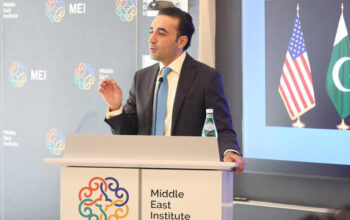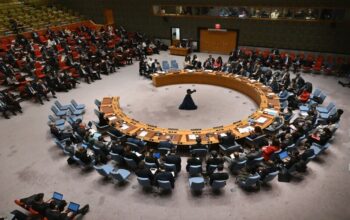By Staff Reporter
ISLAMABAD: Temperatures in parts of Pakistan have reached record levels, putting the lives of millions at risk as the effects of the climate crisis are felt across the country.
The hottest place in the country in the daytime was Jacobabad where 49 degrees Celsius was recorded. Other cities of Sindh also remained in the grip of an extreme heatwave and in most cities, maximum temperature remained above 40 degrees.
Balochistan, Sibbi and Turbat remained the hottest places with maximum temperature ranging between 47 and 46 degrees Celsius respectively.
In Punjab, Bahawalpur remained the hottest city with maximum temperature reaching up to 46 degrees Celsius while in Faisalabad, Multan and Dera Ghazi Khan the maximum temperature remained at 45 degrees Celsius while in Khyber Pakhtunkhwa, the maximum temperature was recorded in Dera Ismail Khan which was 44 degrees Celsius.
“This is the first time in decades that Pakistan is experiencing what many call a ‘spring-less year,” minister of Climate Change, Sherry Rehman said in a statement.
As the heatwave has exacerbated massive energy shortages across the country and many rural areas now barely receives any electricity, with up to 18 hours of load shedding every day.
It has been a similar story in other part of the country where the realities of climate change are being felt by more than 230 million people as the scorching summer temperatures have arrived two months early and the relief of the monsoons are months away.
The heatwave has already had a devastating impact on crops, including wheat and various fruits and vegetables.
In Balochistan’s Mastung district, known for its apple and peach orchards, the harvests have been decimated. Farmers in the area also spoke of a drastic impact on their wheat crops, while the area has also recently been subjected to 18-hour power cuts.
Minister Rehman said the country was facing an existential crisis as climate emergencies were being felt from the north to south of the country.
Rehman warned that the heatwave was causing the glaciers in the north of the country to melt at an unprecedented rate, and that thousands were at risk of being caught in flood bursts.
She also said that the sizzling temperatures were not only impacting crops but water supply as well. “The water reservoirs dry up. Our big dams are at dead level right now, and sources of water are scarce,” Rehman said.
The minister said the heatwave should be a wake-up call to the international community. “Climate and weather events are here to stay and will in fact only accelerate in their scale and intensity if global leaders don’t act now,” she said.
The World Meteorological Organisation said in a statement that the temperatures in Pakistan were “consistent with what we expect in a changing climate. Heatwaves are more frequent and more intense and starting earlier than in the past.”
A heatwave is declared when the maximum temperature is over 40C and at least 4.5C above normal.
Copyright © 2021 Independent Pakistan | All rights reserved




